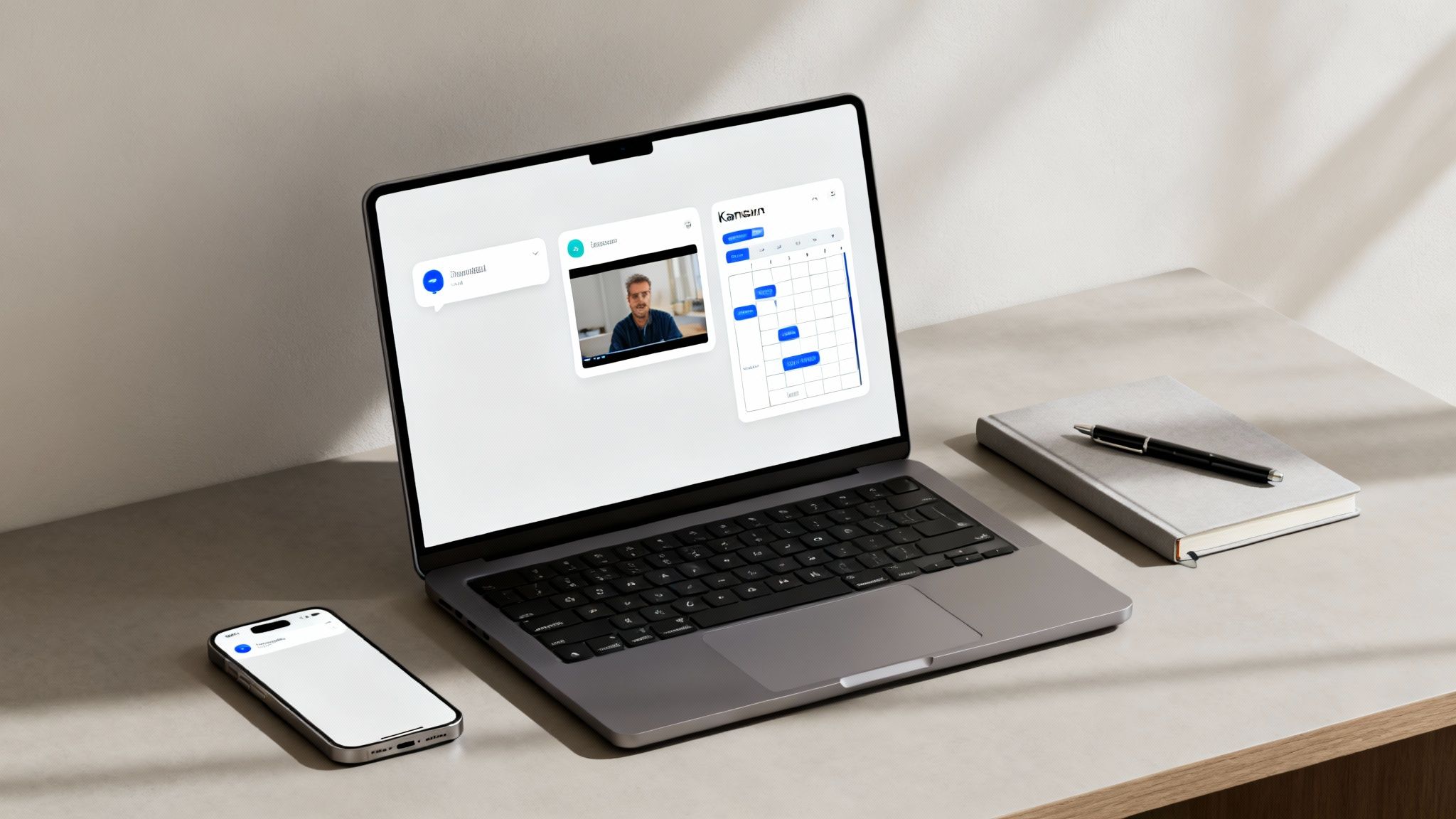Top 10 Remote Job Interview Questions to Master in 2025

Welcome to the new era of hiring. Remote work is no longer a niche perk; it's a fundamental shift in how we build careers and companies. This means interviews have evolved. Employers are not just asking if you can do the job; they're trying to figure out if you can do the job from anywhere. They need to know you have the discipline, communication skills, and technical savvy to thrive without daily in-person supervision.
This guide moves past generic advice to deliver actionable strategies for the most common remote job interview questions. You will learn not just what to say, but how to frame your experiences to showcase your remote readiness. We provide a breakdown of what hiring managers are truly looking for when they ask about your home office setup, communication style, and ability to collaborate across time zones.
Mastering these questions will do more than just prepare you for an interview. It will position you as a top-tier remote candidate who is self-motivated, proactive, and ready to contribute effectively from day one. This article is your blueprint for demonstrating that you are an asset to any distributed team, fully equipped to succeed in a remote-first environment.
1. Tell Me About Your Remote Work Experience
This is one of the most common remote job interview questions because it immediately assesses your direct experience and understanding of the unique demands of a distributed work environment. Hiring managers use this question to gauge your self-awareness, discipline, and existing skill set for thriving without in-person supervision. It's their first opportunity to see if you’ve already navigated the challenges and opportunities of remote work.

Your answer should be a concise story that demonstrates competence and reliability. Avoid simply stating, "I've worked remotely before." Instead, provide concrete evidence of your success in that setting.
How to Structure Your Answer
A strong response goes beyond confirming you have experience; it proves your effectiveness.
- Start with a specific project: Briefly describe a significant project you completed while working remotely. Mention its goal and the successful outcome. For example, "In my previous role, I led a project to redesign our client onboarding process, collaborating with a team spread across three different time zones. We successfully launched it two weeks ahead of schedule."
- Highlight collaboration and tools: Name the specific collaboration tools you used to make the project a success. This shows technical proficiency. Mention platforms like Slack for daily communication, Asana or Jira for project tracking, and Zoom for team meetings.
- Address potential challenges: Proactively mention how you overcame a common remote work challenge, such as communication gaps or staying motivated. This demonstrates self-awareness and problem-solving skills.
2. How Do You Stay Focused and Avoid Distractions at Home?
This is a critical question in any remote job interview because it directly addresses the biggest potential downfall of working from home: the lack of a traditional office structure. Hiring managers ask this to determine if you possess the self-discipline, time management skills, and personal strategies required to maintain high productivity without direct, in-person supervision. They need assurance that you can create a professional environment for yourself, regardless of your physical location.

Your response should demonstrate that you are proactive, not reactive, about managing your environment and schedule. Instead of just saying you're "good at focusing," provide tangible examples of the systems and routines you use to ensure peak performance and minimize interruptions.
How to Structure Your Answer
A compelling answer proves you have a well-defined strategy for productivity.
- Describe your dedicated workspace: Start by explaining your physical setup. For example, "I've set up a dedicated home office in a separate room with an ergonomic chair and dual monitors. This physical separation helps me mentally switch into 'work mode' and signals to my family that I'm focused."
- Explain your productivity techniques: Mention specific methods you use to manage your time and attention. "I structure my day using the Pomodoro Technique, working in 25-minute focused bursts with short breaks. This helps me maintain high concentration, especially on complex tasks."
- Mention tools and boundaries: Show you use technology and clear communication to your advantage. You could say, "I use noise-canceling headphones to block out ambient sounds and set my communication status to 'Do Not Disturb' during deep work sessions. I also communicate my work schedule clearly with my family to manage expectations around interruptions."
3. How Would You Handle Communication with Your Manager and Team Across Different Time Zones?
This is one of the most practical remote job interview questions, as it directly tests your understanding of asynchronous work and global collaboration. Hiring managers want to see if you can be a proactive and considerate team member who respects different work schedules while maintaining high productivity and clear communication. Your answer reveals your ability to adapt, plan, and use technology to bridge geographical distances effectively.

A great response will demonstrate a strategic approach to communication, not just a willingness to be flexible. It should show that you have thought about the specific challenges of time zone differences and have concrete methods for overcoming them, ensuring seamless collaboration and team cohesion.
How to Structure Your Answer
Prove that you can be an effective global team player by outlining a clear, multi-faceted communication strategy.
- Emphasize asynchronous-first communication: Start by highlighting your proficiency with asynchronous tools. For example, "I prioritize detailed, asynchronous communication to respect everyone's focus time. I'd use shared documents for collaborative feedback, project management tools like Asana to track progress, and record video updates with Loom for complex topics."
- Show respect for overlapping hours: Acknowledge the importance of real-time collaboration for specific situations. Mention how you would identify and protect the limited overlapping work hours for high-priority meetings, ensuring they are well-planned and efficient.
- Discuss documentation and clarity: Explain your commitment to documentation. Mention that you would clearly document key decisions, processes, and meeting outcomes in a central hub like Notion or Confluence. This ensures team members in any time zone can stay informed without needing to attend every meeting.
4. Describe Your Experience with Remote Collaboration Tools and Technology
This is one of the most practical remote job interview questions, designed to confirm you have the technical skills needed to be effective from day one. Hiring managers want to see that you can not only use the essential software for communication and project management but also integrate into their existing digital workflows without extensive training. Your fluency with these tools is a direct indicator of your readiness for a distributed role.

A great answer moves beyond just listing software names. It should connect specific tools to tangible outcomes, showing how you leverage technology to drive collaboration, maintain productivity, and solve problems in a remote environment.
How to Structure Your Answer
Your response should demonstrate both your technical proficiency and your strategic use of technology to achieve business goals.
- Categorize your tools: Group your experience by function. For example, "For communication, my team relied heavily on Slack for real-time updates and Zoom for our weekly syncs. For project management, we used Jira to track sprints and tickets, which gave everyone visibility into our progress."
- Show how you used them: Provide a specific example of how a tool helped solve a problem or improve a process. You could mention creating a specific Slack channel to streamline cross-departmental communication or using Asana's timeline feature to reallocate resources on a tight deadline. Learn more about the best remote team collaboration tools to expand your knowledge.
- Emphasize adaptability: Conclude by expressing your enthusiasm and ability to learn new platforms quickly. Acknowledge that every company has its own tech stack and state your confidence in adapting to their preferred tools.
5. Tell Me About a Time You Had a Conflict with a Coworker Remotely. How Did You Resolve It?
Conflict is inevitable, but how it's handled remotely is a critical test of your communication skills and emotional intelligence. This behavioral question is one of the more insightful remote job interview questions because it reveals how you navigate disagreements without the benefit of face-to-face interaction and non-verbal cues. Hiring managers want to see that you can resolve issues constructively and maintain strong professional relationships from a distance.
Your answer should demonstrate maturity, proactivity, and a focus on resolution over blame. Showcasing your ability to handle sensitive situations thoughtfully proves you are a reliable and collaborative remote team member. Avoid stories where you were clearly right and the other person was wrong; instead, choose a situation that highlights mutual understanding and growth.
How to Structure Your Answer
Use the STAR method (Situation, Task, Action, Result) to frame your response, ensuring it is clear, concise, and impactful.
- Set the Scene (Situation): Briefly describe the context. For instance, "A colleague and I had a miscommunication over Slack regarding project deadlines. Their interpretation of my message led them to believe a key deliverable was due a week later than it actually was."
- Emphasize Proactive Communication (Action): Detail the specific steps you took to resolve the issue. Focus on moving the conversation to a more effective channel. "I noticed the tension in our written exchange, so I immediately suggested we jump on a quick video call to clear things up. On the call, I actively listened to their perspective before calmly explaining my own."
- Share the Positive Outcome (Result): Conclude by explaining how the conflict was resolved and what you learned. "By talking face-to-face, we quickly resolved the misunderstanding and got the project back on track. We agreed to use a shared project board for all future deadline communication to prevent similar issues. The experience ultimately strengthened our working relationship."
6. How Do You Ensure Work-Life Balance While Working Remotely?
This question is a crucial test of your self-management skills and awareness of the potential for burnout in a remote setting. Hiring managers ask this to see if you have proactive strategies to maintain your well-being and, consequently, your long-term productivity. They want to hire employees who can sustain high performance without direct supervision, which requires a strong sense of personal boundaries.
Your answer should show that you are intentional about separating your professional and personal life. It demonstrates maturity and an understanding that consistent performance is built on a foundation of good mental and physical health. Avoid generic answers like "I make sure to take breaks." Instead, provide concrete examples of your routines and boundaries.
How to Structure Your Answer
A compelling response proves you have a deliberate and effective system for maintaining balance.
- Describe your boundary-setting rituals: Explain a specific routine you use to begin and end your workday. For instance, "I bookend my workday with a 15-minute walk. This acts as my 'commute' and helps me mentally switch on in the morning and disconnect completely in the evening."
- Mention your physical workspace strategy: Detail how you create a physical separation between work and life, even in a small space. You could say, "I have a dedicated desk for work, and at the end of the day, I close my laptop and tidy the space. This signals that my professional duties are over."
- Highlight your communication approach: Explain how you manage expectations around availability. For example, "I set my status on Slack to 'away' and turn off work notifications on my phone outside of my set working hours. This ensures I can fully recharge and be more focused the next day." Learn more about effective work-life balance strategies to refine your approach.
7. Describe Your Most Recent Project and Your Role in It. How Did You Contribute Remotely?
This behavioral question is designed to get a detailed, evidence-based look at your capabilities. Hiring managers use it to move beyond theoretical skills and see how you apply them in a real-world, remote context. They want to understand your project management approach, your specific contributions, and your ability to deliver tangible results without direct supervision.
Your answer needs to be a clear, compelling narrative that showcases your skills in action. It’s your chance to provide concrete proof of your value as a remote employee by connecting your work directly to measurable outcomes. Vague descriptions won’t be effective; specifics are crucial.
How to Structure Your Answer
A strong answer will guide the interviewer through a recent success story, highlighting your remote competencies along the way.
- Set the stage with project goals: Start by outlining a recent project and its primary objective. For instance, "In my last role as a remote data analyst, my most recent project involved building a new sales dashboard to provide our globally distributed team with real-time performance insights."
- Detail your specific role and contributions: Clearly define what you did. Explain the tasks you owned and the actions you took. Mention the specific tools used, like, "I was responsible for data collection from various sources, and I used Tableau to design and implement the interactive dashboards, ensuring the data was easily accessible for team members in different time zones."
- Quantify your impact: Connect your work to a measurable result. This is one of the most critical parts of answering remote job interview questions effectively. Conclude with a metric, such as, "The new dashboard increased data reporting efficiency by 30% and was credited with helping the sales team identify a new market opportunity."
8. How Do You Proactively Communicate Updates and Progress Without Being Asked?
In a remote setting, managers don't have the luxury of walking by your desk to see that you're working diligently. This question directly probes your initiative, transparency, and self-management skills. Hiring managers want to know if you are a proactive communicator who keeps the team informed or if you require constant check-ins, which is inefficient for a distributed team. It's a key indicator of your reliability and accountability.
Your answer needs to show that you have a deliberate system for providing visibility into your work. Avoid a generic response like, "I keep people updated." Instead, detail the specific methods and cadences you use to ensure stakeholders are always in the loop without having to ask for an update.
How to Structure Your Answer
A compelling answer demonstrates a clear, repeatable process for proactive communication.
- Outline your communication cadence: Start by describing your regular update schedule. For example, "I practice a rhythm of communication that includes a daily stand-up summary in our team's Slack channel and a more detailed weekly progress report via email on Fridays."
- Specify the content of your updates: Detail what information you share. Mention that your updates typically include tasks completed, key metrics, any blockers you're facing, and your priorities for the next day or week. This shows a structured approach.
- Reference tools and documentation: Mention how you use tools to provide real-time visibility. For instance, "I ensure all my tasks are kept up-to-date on our Jira board, so anyone can see the status of a project at a glance." This highlights your proficiency with project management platforms.
- Explain how you handle challenges: Show that you don't just share good news. Mention your process for flagging risks early. For example, "If I anticipate a potential delay, I communicate it immediately with a proposed solution rather than waiting until the deadline is at risk."
9. What Strategies Do You Use to Build Relationships and Connect with Team Members in a Remote Environment?
This question probes your emotional intelligence and proactivity in fostering team cohesion from a distance. Hiring managers ask this to see if you understand that strong working relationships don't just happen in a remote setting; they must be intentionally built. Your ability to connect with colleagues directly impacts collaboration, morale, and the overall company culture.
Your answer should demonstrate that you are a thoughtful and engaged team member who takes initiative. Avoid generic responses like "I'm a people person." Instead, provide specific examples of how you create and maintain connections with your remote coworkers.
How to Structure Your Answer
A compelling answer shows you've thought deeply about the social dynamics of remote work.
- Start with intentional one-on-one connections: Begin by explaining how you build individual relationships. For instance, "I make it a point to schedule informal 15-minute virtual coffee chats with new team members during their first week. This helps build rapport beyond project-related discussions."
- Highlight participation in group activities: Show that you engage with the wider team culture. Mention your involvement in things like virtual social hours, interest-based Slack channels (#book-club or #pet-photos), or company-wide events. This signals you're a team player who contributes to a positive environment.
- Emphasize celebrating others: Describe how you acknowledge and celebrate team and individual successes. You could say, "I always make sure to use our team's #wins channel to give a shout-out to a colleague who helped me on a task or reached a major milestone. Recognizing contributions is key to building morale." Learn more about effective virtual team building activities to get more ideas.
10. How Do You Handle Feedback and Criticism When Working Remotely?
This is one of the more insightful remote job interview questions, as it probes your emotional intelligence and commitment to growth in a setting where feedback can feel more impersonal. Without the non-verbal cues of an in-person conversation, written criticism can be misinterpreted. Hiring managers want to see that you are receptive, resilient, and can translate feedback into actionable improvement without direct supervision. Your response reveals your maturity and growth mindset.
A great answer shows you not only accept feedback but actively seek it out. It demonstrates that you see criticism as a tool for professional development, not a personal attack, which is crucial for thriving in a remote team.
How to Structure Your Answer
A strong response will showcase a clear, professional process for handling constructive criticism.
- Acknowledge its importance: Begin by stating that you view feedback as essential for growth, especially in a remote environment where clarity is key. For example, "I see all feedback, positive or critical, as a gift that helps me improve. In remote work, I believe clear, direct feedback is vital for keeping everyone aligned and performing at their best."
- Provide a specific example: Describe a situation where you received criticism remotely and how you acted on it. Mention the context, the feedback, and the positive outcome. "In my last role, I received feedback during a code review that my commenting was not detailed enough for our asynchronous team. I immediately thanked my colleague, revised the code, and created a new personal checklist to ensure all my future submissions were thoroughly documented. This improved team efficiency on subsequent projects."
- Describe your proactive process: Explain how you actively seek out feedback rather than just waiting for it. Mention scheduling check-ins or asking for input after completing a major task. This shows initiative and a true commitment to continuous improvement.
10 Remote Interview Questions Comparison
| Question | Complexity 🔄 | Resources ⚡ | Outcomes 📊 | Use cases 💡 | Advantages ⭐ |
|---|---|---|---|---|---|
| Tell Me About Your Remote Work Experience | Low 🔄 | Minimal ⚡ | Validates prior remote history, communication habits 📊 ⭐⭐⭐ | Screening for remote-fit hires, early interviews 💡 | Direct evidence of adaptation and tool comfort ⭐ |
| How Do You Stay Focused and Avoid Distractions at Home? | Low 🔄 | Minimal ⚡ | Reveals discipline, routines, productivity techniques 📊 ⭐⭐ | Roles requiring independent productivity and time management 💡 | Identifies self-starters with practical systems ⭐ |
| How Would You Handle Communication Across Different Time Zones? | Medium 🔄 | Moderate ⚡ | Shows async skills, scheduling and documentation ability 📊 ⭐⭐⭐ | Global teams, distributed engineering/product teams 💡 | Demonstrates planning, cultural awareness, overlap strategies ⭐ |
| Describe Your Experience with Remote Collaboration Tools and Technology | Medium 🔄 | Low–Moderate ⚡ | Assesses technical literacy and onboarding speed 📊 ⭐⭐⭐ | Tech-heavy roles, rapid ramp-up positions 💡 | Predicts reduced training time and tool adaptability ⭐ |
| Tell Me About a Time You Had a Conflict with a Coworker Remotely. How Did You Resolve It? | Medium 🔄 | Moderate ⚡ | Evaluates emotional intelligence and conflict resolution 📊 ⭐⭐ | Team roles, leadership candidates, customer-facing positions 💡 | Reveals diplomacy, listening, and relationship repair skills ⭐ |
| How Do You Ensure Work-Life Balance While Working Remotely? | Low 🔄 | Minimal ⚡ | Indicates burnout awareness and sustainable practices 📊 ⭐ | Long-term roles, high workload positions 💡 | Signals likelihood of retention and steady performance ⭐ |
| Describe Your Most Recent Project and Your Role in It. How Did You Contribute Remotely? | Medium–High 🔄 | Moderate ⚡ | Provides concrete impact, metrics, and delivery evidence 📊 ⭐⭐⭐ | Senior/technical hires, roles requiring proven outcomes 💡 | Demonstrates measurable contributions and remote delivery skills ⭐ |
| How Do You Proactively Communicate Updates and Progress Without Being Asked? | Medium 🔄 | Low ⚡ | Reveals initiative, transparency, and cadence practices 📊 ⭐⭐ | Independent contributors, remote managers, distributed teams 💡 | Reduces need for micromanagement; improves trust ⭐ |
| What Strategies Do You Use to Build Relationships and Connect with Team Members Remotely? | Medium 🔄 | Moderate ⚡ | Shows culture-building, engagement and onboarding ability 📊 ⭐ | Roles requiring cross-team collaboration and morale building 💡 | Strengthens team cohesion and inclusion remotely ⭐ |
| How Do You Handle Feedback and Criticism When Working Remotely? | Medium 🔄 | Low–Moderate ⚡ | Assesses coachability, growth mindset, and follow-up actions 📊 ⭐⭐ | Performance-driven roles, roles with frequent reviews 💡 | Indicates resilience, continuous improvement, and professional maturity ⭐ |
Your Next Step: From Preparation to Job Offer
Navigating the landscape of remote job interview questions can feel daunting, but as we've explored, success hinges on more than just listing your skills. It's about demonstrating the specific mindsets and behaviors that define a high-performing remote employee. The questions covered in this guide are not random hurdles; they are strategic tools used by hiring managers to uncover your capacity for autonomy, proactive communication, and disciplined self-management.
By preparing for these inquiries, you are building a compelling case for yourself. You're showing that you understand the unique challenges of remote work and have already developed the habits needed to thrive. Each answer becomes a piece of evidence proving your reliability and commitment.
Core Takeaways for Acing Your Interview
Mastering your responses requires focusing on the "why" behind each question. Hiring managers are ultimately looking for confirmation of three core traits:
- Proactive Communication: Can you keep stakeholders informed without constant supervision? Your ability to articulate your strategies for asynchronous updates, cross-timezone collaboration, and progress reporting is crucial.
- Structured Self-Discipline: Do you have established systems for maintaining focus, managing your time, and creating a productive home environment? Providing concrete examples of your routines and distraction-management techniques builds immense trust.
- Intentional Relationship Building: How do you foster connection and camaraderie when you're not sharing an office? Showcasing your methods for building rapport with colleagues digitally proves you can be an integrated and collaborative team member, not just an isolated contributor.
Remember, the goal isn't to deliver a perfect, rehearsed script. It's to internalize these principles so you can share authentic, experience-backed stories that resonate with your interviewer. Your preparation is your greatest asset, transforming potential anxiety into confident articulation. You've now seen what it takes to answer the most common remote job interview questions with authority. The next step is to put that knowledge into action and find the opportunity that's right for you.
Ready to put this knowledge into practice? Head over to RemoteWeek to browse thousands of curated remote job listings. Our platform connects talented professionals like you with forward-thinking companies that value the skills you've just learned to articulate. Start your search today and land the remote role that's perfect for you at RemoteWeek.
